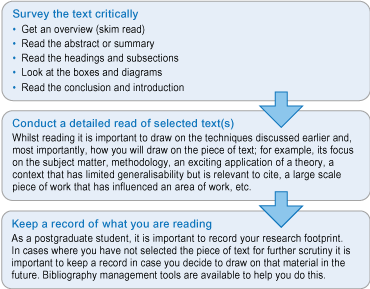2 A process for reading and selecting relevant material
During your studies, you will often encounter the challenge of having to do a lot of reading in a very limited time, so you will have to be selective and economical but, of course, critical, too. Whenever you locate reading materials, it is important to pause and go back to your assignment. Focus on the requirements and key points, and consider how the article may contribute to your preparation of a response. A simple template such as the one shown in Table 1 could be your starting point. Once you have a template like this, you can then move on to the following stages (Figure 1).
| Author | Year | Title | Overview of the contents | Relation to assignment question | How you intend to draw on the material |
| A. Another | 2016 | An exploratory study of student perceptions of the importance of study skills in higher education |
It is very important that you take notes on what you read, to help map concepts and ideas, and how these relate to your own thoughts. Cameron (2009) suggests that note-taking enhances your concentration and understanding, helps you to retain what you have read, and is useful when revising content. Representing your understanding and/or ideas graphically is also a useful way of assimilating information, as we have seen from previous sessions. There are a number of free applications and software that can help you do this, and you can search for these online.
Critical reading will enable you to analyse both written and oral materials for their relevance and appropriacy. It allows you to make judgements about your sources of information and evidence. This is an important postgraduate skill that you need to demonstrate – it requires in-depth engagement with material, helps you to enhance your understanding of the subject matter, and helps you to make informed judgements. Engaging with this process will enable you to work more effectively, as you will be more thoughtful about the decisions you make, and more careful in approaching your work. Critical reading is also the foundation for critical writing, which we will turn to now.

